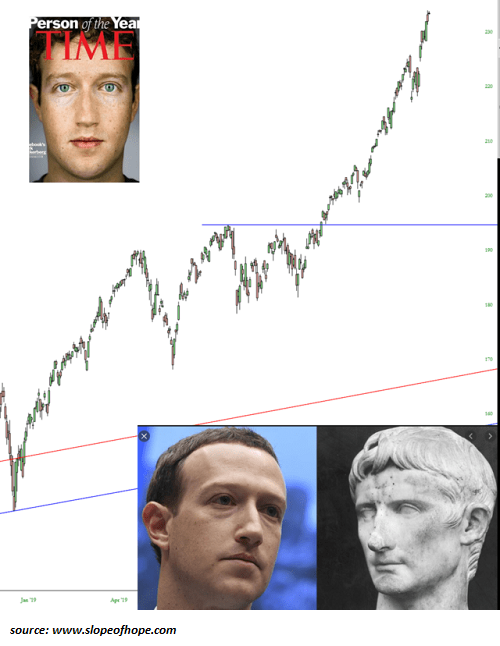You better bow low and pay up, peasant, or your voice in the digital world will disappear just as quickly as your democracy's control over Big Tech.
Who's the junior partner in global hegemony, Big Tech or the U.S. government? The question would have been laughable just a few years ago, but now it's a viable debate when we ask questions like: which one plays a larger role in your daily life, Big Tech platforms or the government? If controlling the flow of data is now the primary means of production, then who owns control of data flows? As we all know, the answer is Big Tech platforms: Google, Facebook, Apple, Microsoft, Amazon, Twitter, Netflix et al.
As Mark, Jesse and I discuss in our latest salon, The Rise and Fall of the Neo-Feudal Network State, these platforms have become defacto sovereign states with global hegemony over surveillance, censorship, data collection and behavioral influence--what Jesse calls network states.
Since the leadership of these private-sector sovereign entities is effectively monarchical, it is also effectively neofeudal: these platforms are private, closed source systems, managed by black-box algorithms hidden from users and regulators. This is the acme of neofeudalism: there is no democratic control at all by users or citizens.
Whether Facebook will ever hit upon a more coherent approach to protecting the free expression of the powerless as well as the powerful depends on whether it ever comes to grip with its own role as the largest censor in the history of the world. (emphasis added by CHS)"Facebook is governing human expression more than any government does or ever has," said Susan Benesch, a faculty associate at Harvard University's Berkman Klein Center for Internet & Society. "They have taken on the task of defining hate speech and other unacceptable speech, which is a quasi-sovereign power... and we the public have no opportunity to contribute to the decision-making, as would be the case if the decisions were being made by a government."Indeed, despite company executives' paying lip service to the concept of democracy from time to time, Facebook is structurally monarchical.To the University of Virginia media studies professor Siva Vaidhyanathan, campaigners against Facebook need to come to grips with the global nature of its threat."The US got off easy in 2016-- the same year that Rodrigo Duterte took over the Philippines by riding Facebook to victory, and two years after Narendra Modi took over India by riding Facebook to victory. Much of the world suffers from all of the Facebook maladies much worse than the US."Vaidhyanathan argued that solutions to Facebook's ills cannot be achieved with oversight from above but will require a more fundamental shift from below. "The root of Facebook is the fact that it is a global intrusive surveillance system that leverages all that behavioral data to target both ads and non-ad content at us."
In other words, the lords of Big Tech control the digital means of production, and the peasants and serfs are powerless. That is the perfection of neofeudalism. As Mark and Jesse posit, this has effectively flipped the central states (governments) into the junior partners of the privately owned network state/central state global hegemony.
In response, governments now view the quasi-sovereign Big Tech platforms domiciled in their borders as key allies in the struggle for global hegemony. Hence we are witnessing pushback against Chinese social-media giant TikTok, which as Jesse points out, is indeed a global platform for propaganda just like Facebook, Google, et al.
Recall that propaganda isn't just what you're allowed to see, it's also what you're not allowed to see and also what's being promoted on Page One in your feed and what's been buried on Page 23 (to use an old-media analogy).
Meanwhile, these privately owned quasi-sovereign networks are immensely profitable, as they sell the data they collect to advertisers and marketers, including political campaigns. Apple, Google, Amazon, Facebook etc. wield more political power and influence than traditional political advocacy groups because their cash hoards are so stupendous.
The feedback loop is ominous: as government regulators are throttled or marginalized by political pressure bought by privately owned quasi-sovereign Big Tech platforms, the platforms are in effect protected from any democratic control exerted by the citizenry in their nominal "home nation," not to mention the citizenry they influence in other nations.
Unlike the old monopolies like Standard Oil, the quasi-sovereign Big Tech platforms are the media, so there's nothing left to balance their skyrocketing power. As we discuss in the podcast, their control is (in Jesse's term) molecular, so they've effectively dismantled the legacy social-political structures such as working class, middle class, etc.
With mass media replaced by Big Tech's data-flow / behavioral-control molecular media, political coherence has been lost, and so divide-and conquer control mechanisms are now essentially infinite: any group, no matter how coherent, can be splintered into warring fragments by the Big Tech Neofeudal Nobility.
After all, they have the data and they can use it however they want, with no limits or controls by users, citizens or nominally democratic governments.
How do we change the leadership of our Neofeudal Nobility, the privately owned, quasi-sovereign Big Tech platforms? The short answer is: we don't. There is no mechanism left for influencing anything in the monarchies of Facebook, Google, Apple, Amazon, etc al.
Meet the new boss, worse than the old boss. You better bow low and pay up, peasant, or your voice in the digital world will disappear just as quickly as your democracy's control over Big Tech.
* * *
